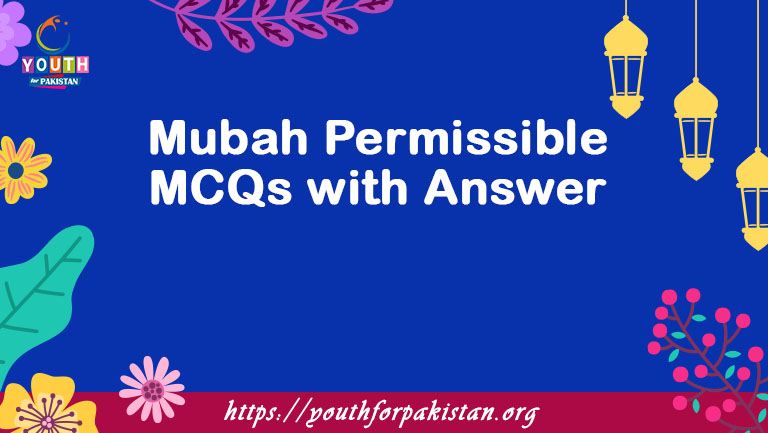The following are Mubah Permissible MCQs with answers related to Islamic Studies. We have arranged the most important and repeated MCQs in all the competitive examinations. The students can clear their concepts for Mubah Permissible MCQs online quiz by attempting these.
Mubah Permissible Online MCQs with Answers
What does the term “Mubah” refer to in Islamic law?
a) Forbidden actions
b) Obligatory actions
c) Recommended actions
d) Permissible actions
Mubah actions are:
a) Optional
b) Required
c) Forbidden
d) Disliked
Which of the following actions falls under the category of Mubah?
a) Praying five times a day
b) Giving to charity
c) Stealing
d) Wearing casual clothes
Mubah actions have no specific:
a) Reward
b) Consequence
c) Purpose
d) Timeframe
Permissible actions are not associated with:
a) Virtue
b) Sin
c) Accountability
d) Community welfare
The status of Mubah actions is determined by:
a) Scholarly opinions
b) Cultural practices
c) Individual preferences
d) Divine revelation
Mubah actions can become recommended by:
a) Practicing scholars
b) Divine decree
c) Personal inclinations
d) Voluntary intentions
Mubah actions are:
a) Discouraged
b) Encouraged
c) Neutral
d) Obligatory
The permissibility of an action is determined by its:
a) Cultural significance
b) Social status
c) Compatibility with Sharia
d) Monetary value
Mubah actions do not involve:
a) Fulfilling duties
b) Religious obligations
c) Moral considerations
d) Personal choices
The concept of Mubah reflects the idea of:
a) Balancing rights and obligations
b) Absolute obedience
c) Striving for perfection
d) Rejecting societal norms
Mubah actions are often subject to:
a) Divine intervention
b) Individual interpretation
c) Government regulations
d) Political ideologies
The permissibility of an action is not influenced by:
a) Cultural context
b) Legal obligations
c) Community values
d) Personal intentions
Mubah actions are:
a) Bound by strict rules
b) Independent of ethical considerations
c) Limited to specific occasions
d) Always discouraged
The practice of Mubah reflects the Islamic value of:
a) Ihsan (excellence)
b) Riya (showing off)
c) Nifaq (hypocrisy)
d) Dhikr (remembrance)
Mubah actions can involve:
a) Fulfilling societal duties
b) Exceeding legal limits
c) Voluntary acts of worship
d) Activities with no moral significance
The application of Mubah principles requires:
a) Rigid adherence to tradition
b) Consultation with legal experts
c) Blind obedience to authority
d) Sole reliance on personal desires
Mubah actions do not involve a direct connection with:
a) Social norms
b) Divine guidance
c) Cultural practices
d) Moral values
The concept of Mubah helps maintain a balance between:
a) Rights and obligations
b) Religion and politics
c) Tradition and innovation
d) Rulings and recommendations
The permissibility of an action can sometimes change due to:
a) Technological advancements
b) Political influences
c) Personal whims
d) Economic fluctuations
The practice of Mubah helps prevent:
a) Extremism
b) Social interactions
c) Legal disputes
d) Charitable acts
Mubah actions can sometimes involve:
a) Deliberate harm to others
b) Non-religious obligations
c) Disregard for public welfare
d) Individual preferences
The principle of Mubah can be applied by:
a) Religious scholars only
b) Political leaders only
c) Laypeople only
d) Everyone in society
Mubah actions do not involve:
a) Personal accountability
b) Ethical considerations
c) Voluntary worship
d) Cultural practices
The concept of Mubah reflects the idea of:
a) Relying on personal opinions
b) Balancing rights and responsibilities
c) Blind imitation
d) Ignoring societal norms
Mubah actions are:
a) Solely based on divine texts
b) Subject to individual interpretations
c) Fixed and unchanging
d) Restricted to scholarly opinions
The practice of Mubah is most closely related to the concept of:
a) Halal (lawful)
b) Haram (forbidden)
c) Wajib (obligatory)
d) Mustahabb (recommended)
Mubah actions are often left to:
a) Political leaders
b) Individual discretion
c) Religious authorities
d) Community consensus
The concept of Mubah is closely tied to the concept of:
a) Taqwa (piety)
b) Qiyas (analogy)
c) Ijtihad (independent reasoning)
d) Fiqh (jurisprudence)
Mubah actions can sometimes lead to:
a) Ethical dilemmas
b) Social isolation
c) Political conflicts
d) Religious obligations
The principle of Mubah emphasizes:
a) Obedience to political leaders
b) Striving for perfection in all actions
c) Balancing individual rights with communal well-being
d) Rejection of societal norms
Mubah actions do not involve:
a) Preservation of social order
b) Fulfillment of personal desires
c) Ethical considerations
d) Serving public interest
The permissibility of an action is not affected by:
a) Cultural context
b) Individual intentions
c) Legal obligations
d) Economic conditions
Mubah actions are often determined by:
a) Divine revelation
b) Scholarly consensus
c) Personal preferences
d) Government regulations
The concept of Mubah reflects the Islamic value of:
a) Tawakkul (reliance on God)
b) Taqwa (piety)
c) Tawhid (monotheism)
d) Tazkiyah (purification)
Mubah actions are not based on:
a) Legal precedent
b) Cultural practices
c) Individual interpretation
d) Scholarly consensus
The principle of Mubah can sometimes lead to:
a) Moral ambiguity
b) Strict adherence to tradition
c) Cultural intolerance
d) Blind imitation
Mubah actions are often:
a) Linked to divine reward
b) Independent of personal intentions
c) Governed by strict rules
d) Encouraged by religious texts
The practice of Mubah reflects the idea of:
a) Upholding societal norms
b) Exercising personal autonomy
c) Rejecting cultural practices
d) Ignoring communal welfare
Mubah actions are often determined by:
a) Rigid legal codes
b) Local customs
c) Religious sects
d) Political ideologies
The application of Mubah principles requires considering:
a) Personal desires only
b) Societal norms only
c) Religious obligations only
d) Both societal norms and religious obligations
Mubah actions are not influenced by:
a) Political agendas
b) Cultural influences
c) Ethical considerations
d) Legal stipulations
The concept of Mubah emphasizes:
a) Isolation from society
b) Individual autonomy within boundaries
c) Absolute obedience to authority
d) Adherence to strict legal codes
Mubah actions do not necessarily contribute to:
a) Personal growth
b) Social harmony
c) Cultural diversity
d) Religious obligations
The principle of Mubah is closely related to the concept of:
a) Ihsan (excellence)
b) Taqwa (piety)
c) Ijtihad (independent reasoning)
d) Qiyas (analogy)
Mubah actions are not restricted by:
a) Social norms
b) Scholarly opinions
c) Personal preferences
d) Divine revelation
The concept of Mubah can sometimes lead to:
a) Exclusivity of actions
b) Erosion of moral values
c) Preservation of cultural practices
d) Adherence to religious obligations
Mubah actions are not specifically tied to:
a) Personal inclinations
b) Community welfare
c) Ethical considerations
d) Legal obligations
The practice of Mubah is based on the principle of:
a) Taqlid (imitation)
b) Ijma (consensus)
c) Ijtihad (independent reasoning)
d) Tawakkul (reliance on God)
Mubah actions do not necessarily align with:
a) Religious teachings
b) Cultural norms
c) Personal interests
d) Social obligations










